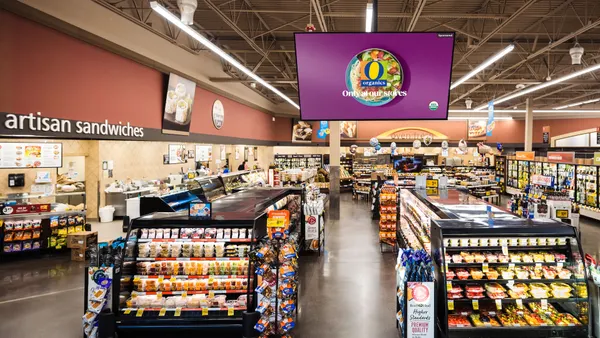Dive Brief:
- Marketers are more likely to increase their budgets for Amazon than they are for other platforms like Google, Bing, Twitter and Facebook in the next year, according to a study by ClickZ Intelligence and GroupM's Catalyst cited in MediaPost. Sixty-three percent of companies advertising on Amazon plan to bump up their budgets on the e-commerce site, compared to 54% for Google, 53% for Facebook and less than 30% for both Twitter and Bing.
- Some of the brands already investing in Amazon Prime's NFL game streams include Gillette, PepsiCo and Hyundai, according to a report in The Wall Street Journal. However, it is not clear if packages went for the $2.8 million asking price or for significantly less.
- The ClickZ study also included a consumer element that found that 43% of consumers had bought groceries through Amazon in the past year, while 66% had bought clothes, 64% personal care products and 63% purchased furniture and home décor. Fourteen percent of consumer respondents owned an Amazon Echo and another 32% are considering buying the voice-based assistant. At the same time, just 15% of businesses have an Alexa skill, per the study.
Dive Insight:
As Amazon continues to grow beyond its e-commerce origins, marketers seem to be more willing to allocate more of their ad budgets toward the site, something that WPP CEO Martin Sorrell speculated would happen during the holding company's Q4 earnings call back in March. Overall, Amazon is still a small player in marketing budgets, but the report suggests it is starting to gain on its competitors.
Where Amazon separates itself from its larger digital competitors Google and Facebook is its transactional data, according to Catalyst's head of search Chris Humber in the MediaPost report.
"It's the Holy Grail and what Google would like to have, the missing piece that allows Amazon to move from predictive to prescriptive search, so they can recommend proactively," he said.
Beyond the transactional data for targeting, ads appearing on Amazon properties are reaching people already on an e-commerce site, meaning not only are they most likely looking to make a purchase, they're at the place where they can make that purchase with just a few clicks. Amazon is also a strong player in mobile, where marekters continue to struggle to make a connection.
On the voice-based front, marketers have been somewhat slow to integrate Alexa skills into their offerings. Though just 14% of consumers in the study own an Echo device, a promising portion reported they're interested in purchasing the tech in the near future, a potential signal to marketers that their customers are ready to engage with their brands via voice-based Alexa skills.










